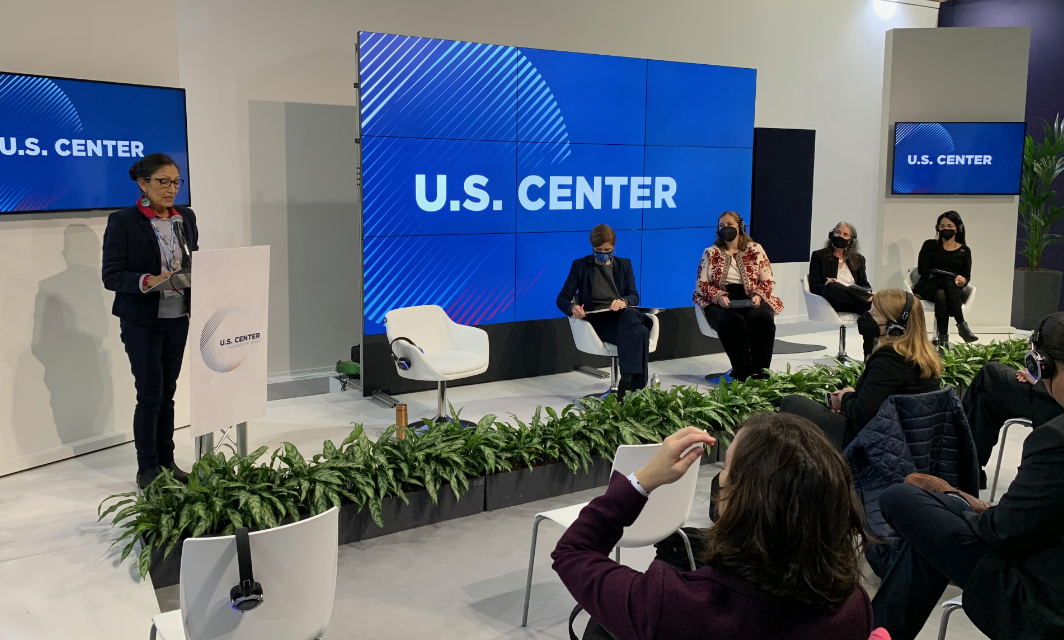
- Details
- By Native News Online Staff
U.S. Secretary of the Interior Deb Haaland (Laguna Pueblo) and other Interior Dept. officials spent their last day of the Secretary of the Interior Deb Haaland and Department leaders spent their last day of the 26th United Nations Climate Change Conference of the Parties (COP26) highlighting Indigenous-led and nature-based solutions to address the dual crises of climate change and impacts to biodiversity.
On Saturday, Haaland and of the United States Agency for International Development (USAID) Samantha Power hosted the “Saving Nature to Save Ourselves” panel to underscore the urgency of U.S. domestic and international nature-based efforts to address climate change and conserve biodiversity, as well as the importance of using Indigenous knowledge for conservation efforts.
Want more Native News? Get the free daily newsletter today.
“We need every person and every tool to address the twin challenges of the climate and biodiversity crises. And when we ensure that Indigenous people are at the table and part of the conversation, we all win,” Haaland said. “If we are going to be successful in tackling climate change and addressing the biodiversity crisis, we have to empower the original stewards of the land.”
The panel discussion highlighted how the climate crisis is hastening an extinction crisis that threatens the biodiversity of our planet and the health of the natural systems that supply our food, water, and other resources. Secretary Haaland and Administrator Power were also joined by Assistant Secretary for Fish and Wildlife and Parks Shannon Estenoz, Principal Deputy Assistant Secretary for Policy, Management and Budget Rachael Taylor, and USAID Agency Climate Change Coordinator and Deputy Assistant Administrator Gillian Caldwell. Archives of the livestreamed events are available at the U.S. Center's YouTube webpage.
The Department of the Interior is working with U.S. Indigenous communities from the Pacific to the Caribbean, and the lower forty-eight states to Alaska and Hawaii, on community-led climate adaptation and resilience, as well as relocation assistance.
Haaland on Friday hosted a virtual question-and-answer session with Indigenous youth to discuss the impacts of climate change on the rising generation. During the “Elevating Indigenous Youth” event, Haaland heard from youth from around the globe on how climate change is affecting their communities as well as actions they would like world leaders to undertake to achieve our international climate commitments for future generations.
“Indigenous youth recognize that the traditional life ways that are being threatened by climate change are grounded in the outlook that will lead us out of this crisis,” said Secretary Deb Haaland to the Indigenous youth. “Science includes Indigenous knowledge. Our bold action to address the climate crisis is rooted in Indigenous knowledge and the voices of Indigenous youth.”
The youth represented diverse Indigenous voices from across the globe, including representation from the U.S. Virgin Islands, American Samoa, Micronesia, Kenya, Ecuador, Alaska, and Maine.
During the event, Haaland discussed how she became “climate aware” in her youth and affirmed the importance of Indigenous voices in solving the climate crisis. She also emphasized the importance of taking bold climate action to ensure that current and future generations can enjoy access to our lands, waters, and wildlife.
“We all have a lot of work to do, but I want young people to know that every time I consider the impacts of decisions we make at the Department of the Interior, I think about the generations to come who will have to live with that decision,” added Secretary Deb Haaland. “Today, we are at the turning point and though we face the climate crisis, the voices that are here today give me hope for the future.”
More Stories Like This
Native News Weekly (August 25, 2024): D.C. BriefsNavajo Nation Mourns the Passing of Former Vice President Rex Lee Jim
Deb Haaland Earns Endorsement From Communications Workers of America Local 7076
University Soccer Standout Leads by Example
Two Native Americans Named to Democratic Congressional Campaign Committee's“Red to Blue” Program
Help us defend tribal sovereignty.
At Native News Online, our mission is rooted in telling the stories that strengthen sovereignty and uplift Indigenous voices — not just at year’s end, but every single day.
Because of your generosity last year, we were able to keep our reporters on the ground in tribal communities, at national gatherings and in the halls of Congress — covering the issues that matter most to Indian Country: sovereignty, culture, education, health and economic opportunity.
That support sustained us through a tough year in 2025. Now, as we look to the year ahead, we need your help right now to ensure warrior journalism remains strong — reporting that defends tribal sovereignty, amplifies Native truth, and holds power accountable.
 The stakes couldn't be higher. Your support keeps Native voices heard, Native stories told and Native sovereignty defended.
The stakes couldn't be higher. Your support keeps Native voices heard, Native stories told and Native sovereignty defended.
Stand with Warrior Journalism today.
Levi Rickert (Potawatomi), Editor & Publisher

